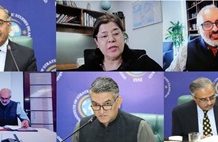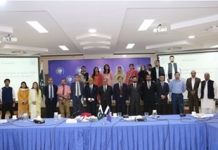We must recognise that political violence, instability and terrorism are inextricably linked with conditions of mass poverty. The question that we must ask ourselves is, can there be peace, stability or national security amidst the sea of poverty?
The unending supply of suicide bombers and trainers, and their readiness to use this method of terror is truly shocking. We seem to be in danger of becoming the second-worst place after Iraq in terms of frequency of terrorist attacks, targeting crowded religious and political rallies as well as unsuspecting citizens.
It is time to realise that this kind of violence will pull down all sections of Pakistani society, including the elite, and undermine economic growth and national solidarity. The vicious cycle of instability and economic decline, a result of our collective failure, will keep feeding extremism without end.
We have agonised enough over the rise of extremism or perhaps not enough. The real challenge is how to close ranks, disregard our political affiliations and think collectively and rationally about the common enemy, terrorism. With the rise of extremism and its violent expression in sectarian and other forms of religion-motivated violence, Pakistan may be facing one of the gravest moments of its history.
First and foremost we must understand the root causes of terrorism, of which we have accumulated too many, with stubborn and mutating effects. There may be differences of opinion on the single most important reason for the growth of extremism or on priorities in our policy responses to it, but one common thread in this debate is the issue of poverty and how it contributes to national insecurity.
We have tended to focus of the externalities of violence and overlook the link between miserable economic conditions in the rural periphery and religious and ethnic extremism. In my view, we must place poverty at the centre of deliberations on terrorism and extremism.
It is sad that we have drifted into discussions of issues of secondary importance, such as those on religious institutions and what they teach. These institutions should continue to be reformed and brought into the mainstream through incentives and support, but they should not divert attention and resources away from the real cause of extremism poverty and how it pushes young men to the arms of terrorists.
Over the past few decades, our responses to the problem of poverty have largely been slow, inadequate and inconsistent. Development assistance from most of the rich to the poor countries has declined in real terms. This has created an explosive situation in the tribal areas of the Frontier, Balochistan and southern Punjab, where poverty has been on the rise.
There is also a global structural reason that we need to keep in mind, because it shapes the political economy of Pakistan. This is an exaggerated faith in the market economy and the process of globalisation. Its assumed positive benefits to the poor rest on the old notions of ‘trickle-down’ economic effects. Prosperity elsewhere and increase in wealth within the poor countries would also increase economic gains for the poor, it is believed.
Faith in the market economy, along with the triumph of democracy and capitalism, has become a new economic religion. Any other model or solution is considered heresy, and economic and political heretics don’t find any space in the public dialogue or in world institutions. Pakistan’s current economic managers breathe and spout nothing but neo-liberal economic theory, without giving any thought to the unique structural characteristics of the country.
The thick catalogue of state failures in pursuing policies of economic equality and fair distribution of wealth and resources must also be reckoned with. Our elite classes have used the weak rule of law and their monopoly of power to keep the benefits of economic growth and opportunity to themselves. Never have they allowed political institutions to grow that would hold them accountable or force them to stay transparent in their conduct of official business.
In development work, especially in big projects, people must be involved and listened to. Under the cover of official secrecy and an institutionalised system of patronage, the elite have kept siphoning off development assistance from abroad and locally generated funds. The rampant systematic corruption in the local government system has hindered any change in the situation of the poor.
Corruption and mismanagement of the economy has created a bottomless pit, nothing from which ever spills over to benefit the poor, while corrupt reptiles of all form and shape continue to gobble up whatever is thrown in it. This is evident from the number of cases that the Public Accounts Committee and the National Accountability Bureau of our country have investigated and brought before the public and the courts. They confirm the belief that poverty is partly a result of systematic plunder by the most powerful sections of society. To lose faith in those who hold power hurts everyone, and the poor sections of society the most. It is powerlessness, unease with inequality and loss of faith in justice and fairness that are behind the drift to extreme measures.
Experts in the field of political economy have consistently warned world leaders that the dispossessed of the world might turn to violent means or take a route of political and religious extremism. Our rulers have not listened to the voices of reason and gone on doing business as usual.
We must recognise that political violence, instability and terrorism are inextricably linked with conditions of mass poverty. The question that we must ask ourselves is, can there be peace, stability or national security amidst the sea of poverty? The policy to create secure islands for the rich in walled-up residential societies, attractive resorts and high-rise luxury apartment buildings away from the zones of rural poverty may not earn them the security they are looking for.
The author is a professor of Political Science at the Lahore University of Management Sciences.












